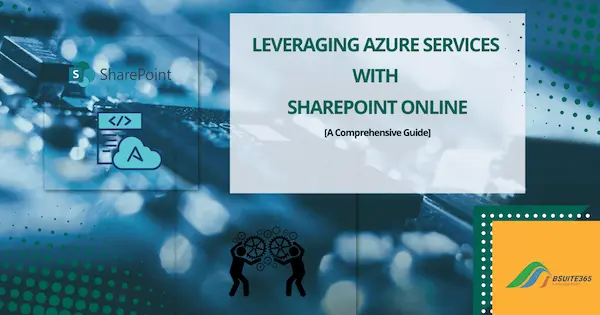Best Practices for Encrypting Data in SharePoint: At Rest and In Transit
In recent years, data security has become increasingly critical due to the constant threat of data breaches. As more businesses rely on cloud platforms like SharePoint, protecting sensitive information from cyber threats has become a top priority.
For organizations using Microsoft SharePoint for collaboration and document management, understanding and implementing strong encryption strategies is essential.
This blog highlights the importance of encrypting data within SharePoint and provides practical strategies for safeguarding your organization’s data.
Understanding Data Encryption in SharePoint
Data encryption is the process of encoding information to make it only accessible to authorized parties. It ensures that even if unauthorized access occurs, the data remains unreadable. This process is fundamental to safeguarding sensitive data from malicious actors.
In SharePoint, encryption plays a crucial role in maintaining confidentiality, integrity, and compliance. In the context of SharePoint, there are two key types of encryption to consider: data at rest and data in transit.
Microsoft has implemented robust encryption standards to protect data in both scenarios, emphasizing its commitment to data security in SharePoint and OneDrive.
1. Encryption of Data at Rest in SharePoint
Refers to inactive data that is stored on disk, such as files or database information. SharePoint utilizes Azure Storage Service Encryption (SSE) with 256-bit AES encryption to secure data at rest. This means that all files stored in SharePoint are automatically encrypted.
- File Chunking and Individual Keys: Files are broken down into smaller chunks, and each chunk is encrypted with a unique key. This granular approach enhances security significantly.
- Distributed Storage: These encrypted chunks are then distributed across multiple Azure storage accounts, adding another layer of protection.
This robust encryption ensures that even if a storage device is compromised, the data remains unreadable without the correct decryption keys.
2. Encryption of Data in Transit in SharePoint
Refers to data being transferred across networks, such as when files are uploaded or downloaded from SharePoint. Protecting data in transit is equally important. SharePoint secures data during transmission using SSL/TLS protocols.
- SSL/TLS Security: All communication between clients and SharePoint servers is encrypted using these industry-standard protocols.
- Strong Encryption Keys: All TLS connections are established using 2048-bit keys, providing a high level of security.
- HTTPS Enforcement: Microsoft enforces secure access by automatically redirecting HTTP connections to HTTPS, ensuring all communication is encrypted.
Best Practices for Enhancing SharePoint Data Encryption
While Microsoft offers robust default encryption, organizations can implement extra measures to strengthen security. To further improve SharePoint data encryption, consider these additional steps:
1. Regularly Update Security Protocols
Continuously update encryption standards and security patches to defend against evolving cyber threats. This proactive approach ensures your defenses remain effective.
2. Implement Multi-Factor Authentication (MFA)
Implement MFA to require users to verify their identity through multiple authentication methods. This critical layer of security drastically reduces the risk of unauthorized access.
3. Conduct Regular Security Audits
Perform periodic audits, including penetration testing and vulnerability scans, to identify and address security weaknesses. This ensures ongoing compliance and security integrity.
4. Educate Users on Security Practices
Educate employees on secure data handling, encryption best practices, and phishing awareness. This empowers users to be a vital part of your security defense, mitigating human error.
Leveraging Additional Security Tools and Integrations
To further augment SharePoint’s built-in security, organizations should strategically leverage these advanced tools and integrations:
Azure Information Protection (AIP) for Granular Data Control
Azure Information Protection (AIP) empowers organizations to classify and protect sensitive data based on its content sensitivity. You can boost SharePoint Online with Azure integration.
This allows for granular control over data access and usage, ensuring that sensitive information remains protected, even when shared externally.
How AIP Works:
- Label Creation: Administrators create labels that define specific protection levels (e.g., “Public,” “Internal,” “Confidential,” “Highly Confidential”). These labels dictate the actions that AIP takes on the data.
- Label Application: Users or administrators apply these labels to documents and files within SharePoint.
- Enforced Protection: AIP then automatically enforces the defined protections associated with each label. This may include:
- Encryption: Scrambling the data to make it unreadable to unauthorized users.
- Access Restrictions: Limiting who can view, edit, print, or forward the document.
- Visual Markings: Adding watermarks or headers/footers to indicate the document’s sensitivity.
Benefits of AIP:
- Precise Data Control: AIP provides granular control over sensitive data, ensuring that only authorized individuals can access it, regardless of where the data is shared.
- Enhanced Data Security: By applying encryption and access restrictions, AIP significantly reduces the risk of data breaches and unauthorized access.
- Simplified Compliance: AIP helps organizations comply with data protection regulations by providing a consistent and automated way to protect sensitive information.
- Clear Example: A “Confidential” label applied to a financial report would automatically encrypt the document and restrict access to authorized employees, even if the file is emailed or downloaded.
Enhanced Security Through Third-Party Integrations
To significantly bolster SharePoint’s security posture, organizations should consider strategically integrating reputable third-party security solutions. These integrations provide advanced threat detection and enhance existing encryption measures, offering a more comprehensive defense.
Functionality and Benefits:
- Advanced Threat Detection and Prevention: Third-party tools offer a range of capabilities, including:
- Advanced malware scanning to detect and prevent malicious software from infiltrating SharePoint.
- Data Loss Prevention (DLP) to prevent sensitive data from leaving the organization’s control.
- User behavior analytics to detect and respond to suspicious activity.
- Advanced encryption.
- Comprehensive Security Layering: These integrations work seamlessly alongside SharePoint’s built-in security features, creating a layered defense that addresses potential security gaps.
- Specialized Protection: Third-party solutions provide specialized protection against emerging threats, ensuring that your SharePoint environment remains secure in the face of evolving cyber risks.
Establish Robust Encryption Key Management Practices
Securely managing encryption keys is paramount for protecting sensitive data. Encryption keys, like digital passwords, unlock encrypted information. Therefore, robust key management practices are essential to prevent unauthorized access.
Key Management System Functionality:
- Secure Storage and Protection: Key management systems (KMS) provide a secure repository for encryption keys, safeguarding them from unauthorized access and tampering.
- Access Control and Tracking: KMS enforces strict access controls, determining who can use specific keys and tracking key usage to maintain an audit trail.
- Key Rotation: KMS automates or facilitates regular key rotation, minimizing the impact of compromised keys.
The Importance of Proper Key Management:
- Losing or having encryption keys stolen renders encrypted data vulnerable.
- Effective key management ensures that only authorized personnel can decrypt sensitive information, minimizing the risk of unauthorized access.
- Prioritizing the secure management and monitoring of encryption keys is a fundamental security practice.
Unlock the Full Potential of SharePoint with BSuite365
BSuite365 provides a complete suite of expert SharePoint consulting and services, designed to transform your organization’s productivity and collaboration. We help you maximize your SharePoint investment by delivering tailored solutions that drive real business results.
Core SharePoint Expertise:
- Customized SharePoint Solutions: We understand that every organization is unique. We create bespoke SharePoint solutions that perfectly align with your specific needs and workflows, moving beyond the “one-size-fits-all” approach.
- SharePoint Development & Customization: Our expert developers craft custom tools and applications within SharePoint, tailoring interfaces, workflows, and functionalities to meet your unique business requirements.
- Seamless SharePoint Migrations: We ensure smooth and efficient migrations to SharePoint, minimizing downtime and prioritizing data security, whether you’re moving from on-premises systems or other platforms.
- Integrated SharePoint Environments: We specialize in integrating SharePoint with Microsoft 365 and third-party applications, creating a unified and efficient digital workspace that streamlines your operations.
- Strategic SharePoint Consulting: Our experienced consultants provide expert guidance on best practices, architecture planning, and optimal configurations, empowering you to leverage SharePoint effectively.
- Proactive SharePoint Support & Maintenance: We offer ongoing support and maintenance to ensure your SharePoint environment runs smoothly, address technical issues, provide updates, and offer timely troubleshooting.
- Engaging SharePoint Intranets: We design and develop intuitive SharePoint intranets that foster internal communication, knowledge sharing, and a strong organizational culture.
How BSuite365 Delivers Tangible Benefits:
- Enhanced Team Collaboration: We empower your teams to collaborate seamlessly, improving document sharing and communication.
- Increased Operational Efficiency: We streamline workflows and automate processes, driving productivity and maximizing efficiency.
- Robust Data Management: We implement effective document management systems within SharePoint, ensuring organized, secure, and easily accessible data storage.
Partner with BSuite365 to transform your SharePoint experience and unlock its full potential. We empower your organization to achieve greater productivity, collaboration, and efficiency.
Conclusion on SharePoint Security Concerns
Safeguarding sensitive data within SharePoint requires a comprehensive approach to encryption. By understanding Microsoft’s built-in encryption features and implementing the best practices outlined in this blog post, organizations can significantly strengthen their data security posture. Remember that while Microsoft provides robust default encryption, proactive management, and additional security measures are essential for optimal protection.
By prioritizing data encryption, you can build trust with your stakeholders, maintain compliance, and protect your valuable digital assets.
Our experts will be glad to help you, If this article didn’t answer your questions. ASK NOW
We believe this content can enhance our services. Yet, it’s awaiting comprehensive review. Your suggestions for improvement are invaluable. Kindly report any issue or suggestion using the “Report an issue” button below. We value your input.


